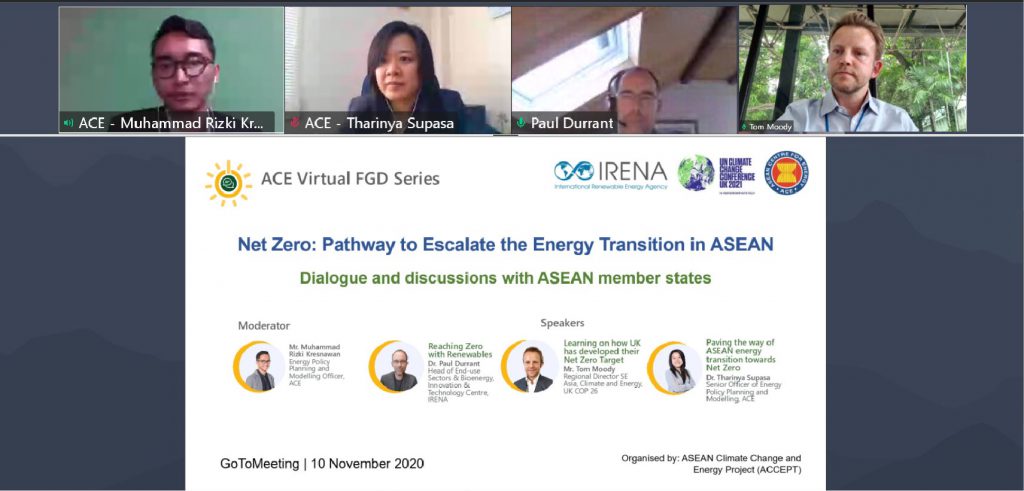Jakarta, 10 Nov 2020
In this discussion, ACCEPT invited Dr. Paul Durrant, Head of End-use Sectors & Bioenergy, Innovation & Technology Centre of International Renewable Energy Agency (IRENA), Mr. Tom Moody, Regional Director SE Asia, Climate and Energy of UK COP26, and Dr. Tharinya Supasa, Senior Officer of ASEAN Centre for Energy (ACE). The discussion was moderated by Mr. Muhammad Rizki Kresnawan, Technical Officer of ASEAN Centre for Energy (ACE).
The session was started with welcoming remarks from Dr. Nuki Agya Utama, Executive Director of ACE, and H.E. Morten Høglund, Ambassador of Norway to ASEAN. They highlighted the importance of the Net Zero target as a pathway to accelerate the energy transition in ASEAN. This discussion is also expected to be a platform to exchange insights and lessons from sharing information on Net Zero on best practices that will help the region achieve it.

Muhammad Rizki Kresnawan, Dr. Paul Durant, Tom Moody, and Dr. Tharinya Supasa having a fruitful dialogue and discussion with ASEAN member states about net zero targets
The first sharing session was given by Dr. Paul Durrant. He explained the findings from IRENA’s publication of Reaching Zero with Renewables that highlighted seven key sectors namely iron and steel, chemicals and petrochemicals, cement and lime, aluminium, road freight, aviation, and shipping that need to be decarbonised in order to achieve the so-called net zero target. These seven sectors will consume energy and produce dominant emissions by 2050 if there are no significant changes.
The second session was continued by the presentation from Mr. Tom Moody on learning from the UK’s experience in developing Net Zero targets. In this session, he presented the importance of a clear long-term strategy (LTS) for all sectors to achieve net-zero emissions, starting with defining the targets, setting the budgets, and doing the scrutiny. This clear LTS could drive the consistent policy, either to send important signals to the market regarding the country’s transition, triggering businesses and investors respond, and also could aligning the LTS with the near-term targets.
In the third session, Dr. Tharinya Supasa from ACE has delivered her key messages regarding the recent 6th ASEAN Energy Outlook (AEO6). During her presentation, Dr. Supasa has highlighted the findings on the future projection if ASEAN could fulfil their aspirational target mentioned in ASEAN Plan of Action on Energy Cooperation (APAEC) 2016-2025, which is 23% Renewable Energy (RE) share in Total Primary Energy Supply (TPES) and 30% Energy Intensity (EI) reduction from 2005 level by 2025.
Through more stringent policies on energy efficiency, AEO6 stated that ASEAN could do the energy saving around 36% from the baseline scenario in the Total Final Energy Consumption (TFEC) by 2040 which led to the less need for power capacity. Apart from that, ASEAN could also further scale up the RE adoption on the end-user side by injecting high penetration biofuel and deploying more solar rooftop application, while in the supply-side, decarbonising the power sector by adding Solar and Wind could also be elevated using the ASEAN Interconnection Masterplan Study (AIMS) III resource assessment with 20% RE penetration limit to the grid.
Next, was a very interesting question and answer session from our three experts and all 40+ participants from the ASEAN Member States.
The session was ended by closing remarks by Mr. Beni Suryadi, Project Manager of ACCEPT. Through this discussion, he hopes that Member States can gain insight on energy-climate nexus in ASEAN, specifically how Net Zero can be a pathway of ASEAN energy transition in the future. He looks forward to the participation of ASEAN policymakers in the last ACCEPT Focus Group Discussion (FGD) in 2020 that will be held on 8 December 2020.
(MRK/R)